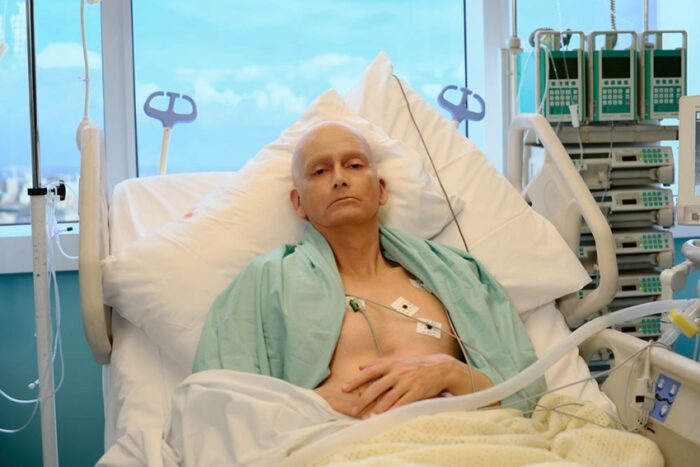True Crime Tuesdays: Litvinenko
Review Overview
Performances
7Script
4Spycraft
2Helen Archer | On 17, Jan 2023
We all love a police procedural. And a common adversary. Litvinenko, ITV’s dramatisation of the fatal poisoning of the eponymous enemy of the Russian state, should deliver on both, galvanising our distrust of the Russian regime while also demonstrating the human cost of its brutality. And yet the four-part series somehow manages to minimise what happened, even as it never deviates from the truth of the terrifying and tragic radioactive attack in the heart of central London.
Written by George Kay (Lupin) and directed by Jim Field Smith (The Wrong Mans), the series begins on 1st November 2006, the day of Alexander Litvinenko’s poisoning – what he describes as the day of his murder, although he wasn’t to die until 23rd November. Celebrating the arrival of British naturalisation papers with his wife and son, Alexander (David Tennant) – known by the diminutive “Sasha” – is soon vomiting up blood. We cut to weeks later, as initially skeptical police DIs Brent Hyatt (Neil Maskell) and Jim Dawson (Barry Sloane) visit him in hospital, where he tells them his background and reveals the identity of his murderer – none other than Vladimir Putin himself, who tasked his death squad to spike a pot of tea with polonium-201, drunk by Sasha in the Millennium Hotel in central London. DS Clive Timmons – the ubiquitous Mark Bonnar – enthusiastically takes on the career-defining case, while DI Hyatt is driven more by the promises he made to Sasha on his deathbed, and the bond created with Sasha’s wife, Marina (Margarita Levieva).
Soon, Hazmat suits are donned in order to pinpoint the exact location of the poisoning, and identify the poisoners themselves. It’s all done with a degree of efficiency which only succeeds in extracting any kind of drama and suspense from the whole affair. By now, Sasha has died offscreen, parlayed to viewers though a statement outside the hospital. Somehow, the death is still shocking – but from here on in, the drama flails. While it may be a relief to some that the programme doesn’t consist of four episodes of a man painfully dying, the short shrift Sasha’s slow death is given distances the viewer from the human tragedy of it.
A trip to Russia to interview the two main suspects proves pointless – and also strangely incompetent. The British envoy seem surprised that the Russians at large not only know they are there, but also that the officials would block their efforts to get to the truth. The first suspect, Dmitri Kovtun, is interviewed in his hospital bed, having claimed to have been poisoned himself by Sasha – not only is the interview fruitless, with Kovtun giving what amounts to “no comment” responses, but as his face is inexplicably covered with bandages, the Brits have no idea if they’re even interviewing the right man. Meanwhile, they rely on the Russians to tape the interview of the second suspect, Andrey Lugovoy, and appear bemused when they return to the UK only to find the tapes are blank. It is far from the sophisticated kind of spycraft and intelligence audiences are used to seeing in such dramas.
From here, international diplomacy and the slow nature of bureaucracy slow down the investigation in real life – but they also slow down the action of the drama. Time passes: Marina is updated on the progress, as her son becomes a young man. She meets with lawyers and allies, she pushes for publicity, and for some sort of nebulous “justice” – which would, presumably, see Putin punished or sanctioned for her husband’s death. There is no catharsis here, though, just as there was none in real life – just a slow process of coming to terms with what has been done, and cannot be undone.
Perhaps this dramatisation was part of that process. Litvinenko died in 2006, and the series takes us up to the late 2010s. It is strange, then, that for all the time the creators had to develop a script, they produced something that seems simultaneously rushed and plodding. While the actors do as best they can with what they had to work with, unfortunately Litvinenko will not win anyone any awards. But worse still, it lets down the man who wanted his death to mean something, and wanted the world to know the cruelty brought down upon him, and so many of his countrymen and comrades.

















